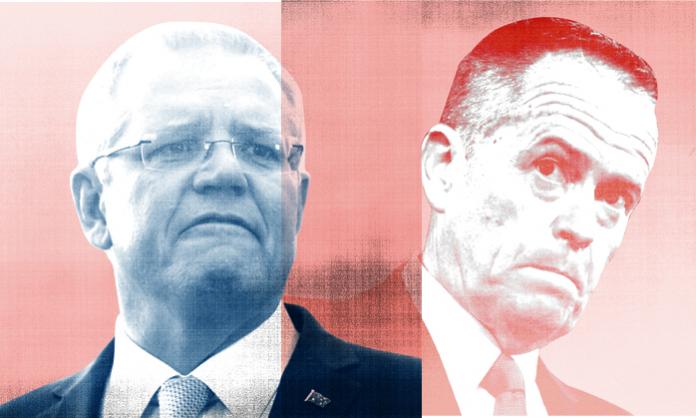A record 17 million people will traipse down to their local primary school or church hall on 18 May. It will for the most part be a sad pilgrimage, bringing little spiritual edification.
The Morrison government is a mean and environmentally destructive disgrace with a face only a company director could love. Its pitch for re-election involves tax cuts that will benefit the highest income earners 20 times more than those on the minimum wage.
It considers reprimanding school students for acting on their concern for climate change to be a winning strategy, so much so that both the education and resources ministers have joined the prime minister in this sententious practice. It has nothing to offer the mass of people, so instead points the finger at immigrants, refugees and the poor. It is attempting to use the tragic bombings in Sri Lanka to drum up support for a new round of draconian anti-terrorism measures, including the creation of temporary exclusion orders to prevent Australian citizens suspected of terrorism from re-entering the country.
Meanwhile, living standards have gone backwards. Wage growth (based on real average male full-time weekly earnings) has been flat since the election of the Liberals in 2013, while real household disposable income per person has declined by 2.8 percent during the Turnbull/Morrison prime ministership. Yet the Liberals continue to argue that the unions have too much power and big business needs a tax break.
Labor offers hopelessly unsatisfactory opposition to this rubbish. ALP leader Bill Shorten is seeking to connect with the prevailing mood by promising some reforms to address inequality.
But Labor refuses to raise Newstart, supports the environmentally disastrous Carmichael coal mine in Queensland’s Galilee Basin and has been studiously vague about exactly which of the draconian industrial rules it might consider changing if elected. Shorten has also made it clear he will not be a “handmaiden to the unions” and that in power Labor will work with all “the different parts of the Australian economic life”, including big business.
With Shorten’s charisma having been privatised back in the ’90s, Labor can manage only a pathetically weak lead over a government that should be facing electoral annihilation.
In this context, the Greens might be expected to be making gains. But with their focus increasingly on the rebellious mood infesting the tennis clubs and golf courses of wealthy blue ribbon Liberal seats like Kooyong and Higgins, the party is failing to provide credible left wing opposition to the major parties.
This explains how a silvertail Olympic skier along with a conga line of loyal Liberal Party functionaries rebranding themselves as independents can appear as a source of hope for people wanting to see the Liberals suffer.
Worse still, a number of right wing outfits, including Clive Palmer’s United Australia Party, Fraser Anning’s Conservative National Party and Pauline Hanson’s One Nation, are all competing for the nationalist protest vote. ABC’s Vote Compass has highlighted how racism is the key issue generating support for groups like One Nation. Ninety-two percent of One Nation supporters want immigration cut, and 95 percent are in favour of boat turn-backs.
This sentiment is encouraged and legitimised by the attention right wing groups get from the media and the fact that the major parties advocate a more respectable version of the same policies.
But polling shows that the majority of people are not hostile to immigration, despite government efforts to blame it for inadequate infrastructure and services. The majority of people support action on climate change, better investment in public schools and expanding Medicare, even if it means high taxes.
There is space for a left wing challenge in Australian politics. A party that is not afraid to champion workers’ rights and the use of workers’ industrial power to redress income inequality. A party that is not so worried about the delicate sensibilities of the coal industry that it isn’t prepared to take real action on climate change. And a party that stands up for Muslims, refugees and immigrants when they are under attack.
Victorian Socialists represents a small but important step in this direction. The party’s solid performance in the Victorian state election last year – where it gained the highest primary vote after Labor, the Liberals and the Greens in the Northern Metro region – demonstrates that there is a constituency receptive to its message.
Red Flag urges people to vote for the Victorian Socialists or other socialist candidates where they are standing, with preferences being directed to Labor or the Greens. The far right should of course be put last.
Whatever happens on election day, whether the Liberals get back in or we are lumbered with a Labor government that offers workers crumbs, big business will continue to call the shots. Only a revival of activity at the grassroots, in workplaces, schools and on campuses, can challenge the wealthy elite.









